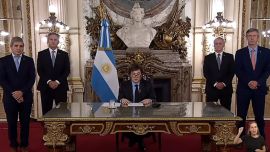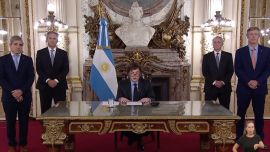Two items dominating this week’s news compete for this column’s attention – the VIP vaccine scandal and the 12-year prison sentence handed out to the Kirchner-linked tycoon Lázaro Báez for money-laundering – but the choice is pretty automatic. This column essentially compares current issues with their antecedents during my 34 years of Buenos Aires Herald newsroom experience and that well runs dry when it comes to vaccines.
This scandal peculiar to pandemic times is wholly unprecedented (although not the underlying abuse of power and privilege, of course). I cannot even remember the most recent pandemic, the swine flu of 2009 (with a grand total of some 600 dead, less than this or any recent week), which had to compete with the aftermath of the 2008-2009 global financial meltdown worldwide and the ferocious midterms face-off with the farm sector at home, plus then-president Cristina Fernández de Kirchner’s chronic allergy to bad news.
Indeed, the only vaccine scandal in my memory is far more recent although dating from that period – six months ago then Health Minister Ginés González García waxed indignant upon discovering four million doses of outdated vaccines in Constitución. These doses were in fact purchased against swine flu in 2009-2010, only to be found surplus to requirements and left unused ever since, including during the presidency of Mauricio Macri, who was then virulently blamed for this neglect.
Nothing unprecedented about corruption, on the other hand, a constant theme in Argentine journalism. Last Wednesday’s conviction of Báez was a rare milestone, of course, and many might argue that the scale of corruption exposed at this trial – entire public works contracts evaporating, not just kickbacks – is unprecedented. Perhaps but it also recalls to mind an old joke from around 1994 to show that it had at least been envisaged long ago. According to this story, then-New York governor Mario (not Andrew, his son) Cuomo – not especially corrupt but tagged as such from growing up in a Mafia-infested neighbourhood – and São Paulo’s notorious Paulo Maluf are exchanging visits. Flying over the Hudson in a helicopter, Cuomo suddenly tells Maluf to look down, which the Brazilian does, spotting a new bridge, whereupon a smiling Cuomo slaps his pocket, saying: “10 percent!” On the return visit Maluf likewise tells Cuomo to look down from the helicopter but the latter sees nothing but a river valley, whereupon a grinning Maluf slaps his pocket exclaiming: “100 percent!”
The paradox of corruption is that it is such an ingrained everyday phenomenon at many levels that it explodes into big news relatively infrequently. Both the human rights priorities of the Herald and a tiny newsroom conspired against us beating other newspapers to an exposé so corruption tended to take a back seat in our agenda although we were ahead of the pack just once – an intrepid reporter (Michael Llanos) had the jump on the National Mortgage Bank scandal of 1987 although the scoop eluded us since the story was held back a day due to the night editor’s refusal to lift a captive page already prepared.
Nor did corruption bulk large in my personal agenda since it is so eminently the domain of the investigative journalist rather than the armchair analyst. My instinct was to avoid it as an editorial topic because corruption is so glaringly wrong that stating the obvious seemed almost idiotic – condemning it in a few words was one thing but stretching that over the 400-500 words which was the standard length of an editorial quite another. Of the 9,073 editorials I wrote for the Herald, I’d be surprised if one percent were on corruption but nevertheless at regular intervals some scandal reached such dimensions that condemnation was absolutely inevitable.
Mention of that 1987 scandal alone suggests that corruption goes back a long way. The remaining space barely suffices to list the sleaze even in my limited experience but even the entire column would only permit the briefest sketch.
Some Carlos Menem obituaries earlier this month have rightly pointed out that corrupt officials became the exception rather than the rule under his 1989-1999 presidency but the problem pre-existed him. The Radical Raúl Alfonsín ran a clean administration compared to both his predecessors and successors but both the aforementioned National Mortgage Bank scandal (doling out soft mortgage loans to friends of the government much like vaccines today) and the “parallel Customs” of Juan Carlos Delconte happened on his watch – “Mazzorín’s chickens” (Domestic Trade Secretary Ricardo Mazzorín buying overpriced rotten chickens from Hungary in 1986) are often listed as corruption but were more probably gross incompetence.
Menem’s corruption scandals can be given shorter shrift than they warrant because they have been exhaustively listed in various media earlier this month following his death. They come in all sizes – from Swiftgate to the overpriced school smocks contract of then-presidential chief-of-staff (and later the first Cabinet Chief) Eduardo Bauzá, both in 1990. Swiftgate (complaints by that historic Chicago company over the bids of Menem officials to gouge bribes before approving installation of a meat-packing plant) was the tip of a huge iceberg, perhaps helping to explain why so many privatisation tenders found their way into Mediterranean rather than their North American or North European hands. Yomagate (money-laundering via presidential sister-in-law and Protocol Secretary Amira Yoma), the gun-running to Croatia and Ecuador, the 1991 sale of the Palermo exhibition grounds to the Rural Society and surreptitious pay supplements to Cabinet ministers add to an even longer list.
The ethical traditions of Radicalism did not prevent corruption from carrying over into the 1999-2001 Alliance administration along with convertibility in the form of the 2000 Senate scandal (when Peronist senators were bribed into approving a labour law reform which came to be known as the Ley Banelco). Suspicions of generalised corruption during the brief caretaker presidency of Eduardo Duhalde never had time to crystallise into any major scandal. Moving onto corruption under the three Kirchner presidencies (2003-2015), this is supposedly unprecedented in scale but also remarkably centralised on the special relationship between Báez and the Kirchner family (leaving aside such sideshows as the shenanigans of transport secretary Ricardo Jaime and public works secretary José López tossing dollar-laden bags over convent walls). Information on Báez is amply available these days. Finally, the Macri administration (2015-2019) was not as corruption-free as its supporters might like to think but the cases currently mounted against it also look pretty flimsy. Alberto, a work in progress.
Lastly, if any reader is expecting a poem on corruption after the ode accompanying last week’s farewell to Menem, my rejoinder would be: “A poem on graft?/Don’t be daft!”




















Comments